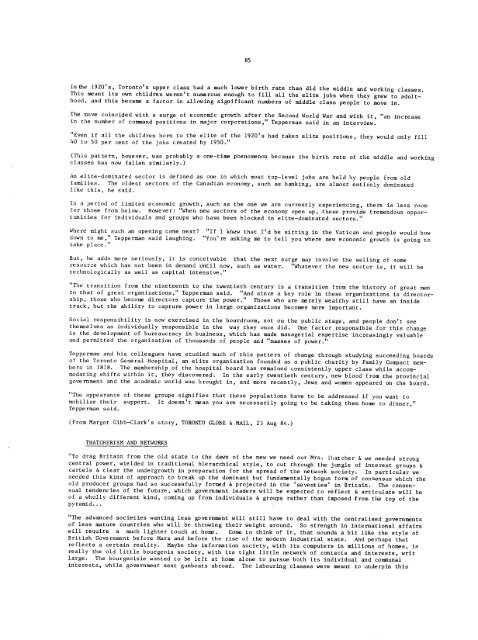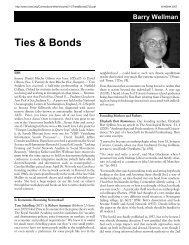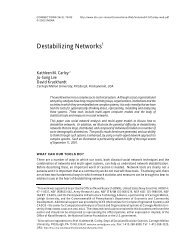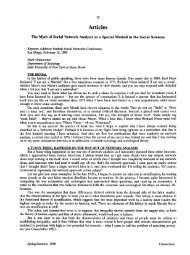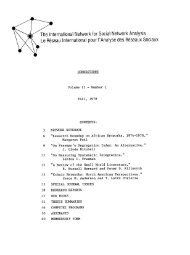(1985). Levine's Atlas of Corporate Interlocks. Connections ... - INSNA
(1985). Levine's Atlas of Corporate Interlocks. Connections ... - INSNA
(1985). Levine's Atlas of Corporate Interlocks. Connections ... - INSNA
Create successful ePaper yourself
Turn your PDF publications into a flip-book with our unique Google optimized e-Paper software.
85<br />
In the 1920's, Toronto's upper class had a much lower birth rate than did the middle and working classes .<br />
This meant its own children weren't numerous enough to fill all the elite jobs when they grew to adulthood,<br />
and this became a factor in allowing significant numbers <strong>of</strong> middle class people to move in .<br />
The move coincided with a surge <strong>of</strong> economic growth after the Second World War and with it, "an increase<br />
in the number <strong>of</strong> command positions in major corporations," Tepperman said in an interview .<br />
"Even if all the children born to the elite <strong>of</strong> the 1920's had taken elite positions, they would only fill<br />
40 to 50 per cent <strong>of</strong> the jobs created by 1950 ."<br />
(This pattern, however, was probably a one-time phenomenon because the birth rate <strong>of</strong> the middle and working<br />
classes has now fallen similarly .)<br />
An elite-dominated sector is defined as one in which most top-level jobs are held by people from old<br />
families . The oldest sectors <strong>of</strong> the Canadian economy, such as banking, are almost entirely dominated<br />
like this, he said .<br />
In a period <strong>of</strong> limited economic growth, such as the one we are currently experiencing, there is less room<br />
for those from below . However : "When new sectors <strong>of</strong> the economy open up, these provide tremendous opportunities<br />
for individuals and groups who have been blocked in elite-dominated sectors ."<br />
Where might such an opening come next "If I knew that I'd be sitting in the Vatican and people would bow<br />
down to me," Tepperman said laughing . "You're asking me to tell you where new economic growth is going to<br />
take place ."<br />
But, he adds more seriously, it is conceivable that the next surge may involve the selling <strong>of</strong> some<br />
resource which has not been in demand until now, such as water . "Whatever the new sector is, it will be<br />
technologically as well as capital intensive ."<br />
"The transition from the nineteenth to the twentieth century is a transition from the history <strong>of</strong> great men<br />
to that <strong>of</strong> great organizations," Tepperman said . "And since a key role in these organizations is directorship,<br />
those who become directors capture the power ." Those who are merely wealthy still have an inside<br />
track, but the ability to capture power in large organizations becomes more important .<br />
Social responsibility is now exercised in the boardroom, not on the public stage, and people don't see<br />
themselves as individually responsible in the way they once did . One factor responsible for this change<br />
is the development <strong>of</strong> bureaucracy in business, which has made managerial expertise increasingly valuable<br />
and permitted the organization <strong>of</strong> thousands <strong>of</strong> people and "masses <strong>of</strong> power ."<br />
Tepperman and his colleagues have studied much <strong>of</strong> this pattern <strong>of</strong> change through studying succeeding boards<br />
<strong>of</strong> the Toronto General Hospital, an elite organization founded as a public charity by Family Compact members<br />
in 1818 . The membership <strong>of</strong> the hospital board has remained consistently upper class while accommodating<br />
shifts within it, they discovered . In the early twentieth century, new blood from the provincial<br />
government and the academic world was brought in, and more recently, Jews and women appeared on the board .<br />
"The appearance <strong>of</strong> these groups signifies that these populations have to be addressed if you want to<br />
mobilize their support . It doesn't mean you are necessarily going to be taking them home to dinner,"<br />
Tepperman said .<br />
(From Margot Gibb-Clark's story, TORONTO GLOBE & MAIL, 23 Aug 84 .)<br />
THATCHERISM AND NETWORKS<br />
"To drag Britain from the old state to the dawn <strong>of</strong> the new we need our Mrs . Thatcher & we needed strong<br />
central power, wielded in traditional hierarchical style, to cut through the jungle <strong>of</strong> interest groups &<br />
cartels & clear the undergrowth in preparation for the spread <strong>of</strong> the network society . In particular we<br />
needed this kind <strong>of</strong> approach to break up the dominant but fundamentally bogus form <strong>of</strong> consensus which the<br />
old producer groups had so successfully formed & projected in the 'seventies' in Britain . The consensual<br />
tendencies <strong>of</strong> the future, which government leaders will be expected to reflect & articulate will be<br />
<strong>of</strong> a wholly different kind, coming up from individuals & groups rather than imposed from the top <strong>of</strong> the<br />
pyramid . . .<br />
"The advanced societies wanting less government will still have to deal with the centralised governments<br />
<strong>of</strong> less mature countries who will be throwing their weight around . So strength in international affairs<br />
will require a much lighter touch at home . Come to think <strong>of</strong> it, that sounds a bit like the style <strong>of</strong><br />
British Government before Marx and before the rise <strong>of</strong> the modern industrial state . And perhaps that<br />
reflects a certain reality . Maybe the information society, with its computers in millions <strong>of</strong> homes, is<br />
really the old little bourgeois society, with its tight little network <strong>of</strong> contacts and interests, writ<br />
large . The bourgeoisie wanted to be left at home alone to pursue both its individual and communal<br />
interests, while government sent gunboats abroad . The labouring classes were meant to underpin this


